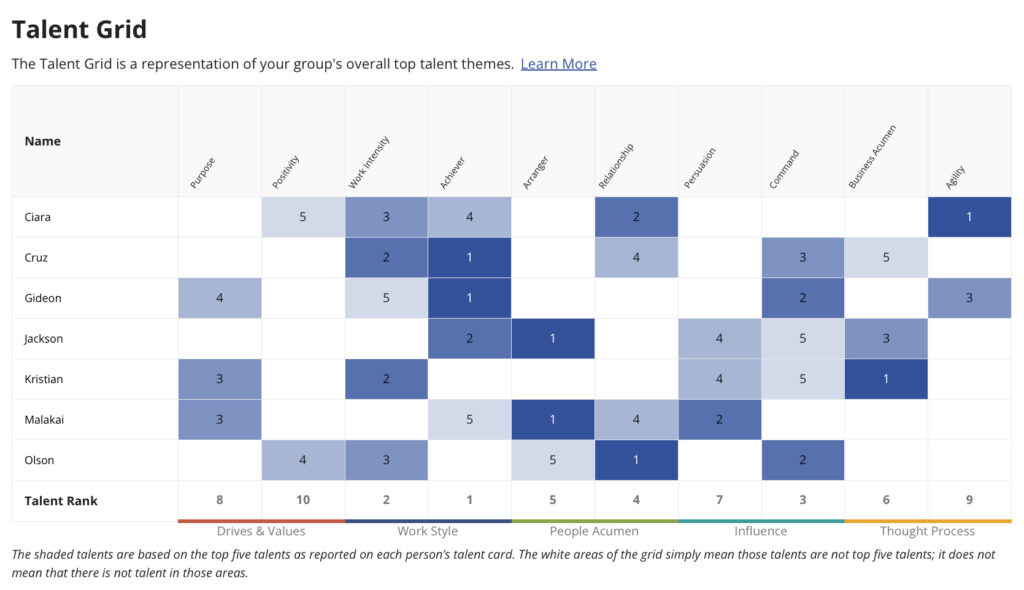
There are many reasons people want to stay and grow at an organization. Promotion tracks, development opportunities, and inspirational leaders are all motivation drivers. Quarterly pizza parties? Perhaps not as much.
In a Great Places to Work survey, across 1.7 million responses, one driver stood above the rest: “Recognize me.” Through routine recognition, employees are more satisfied in their roles, increasing engagement and reducing turnover. This is especially true when recognition is tailored to an individual’s preferences, goals and talents.
At Talent Plus, we know that no two people are alike. Standardized employee recognition examples miss the chance to value each individual’s uniqueness. That’s why we aim to recognize colleagues based on their needs and preferences. Whether it’s a standing ovation or a handwritten note, we work to appreciate what everyone brings to the table.
Thankfully, there are some key questions and steps you can take to easily personalize your recognition and build a highly motivated and engaged team.
Questions For Recognition that Sticks
You can’t expect yourself to know employee recognition preferences right away. Here are some questions you can ask to learn more about their likes and dislikes.
When was a time you felt recognized for your efforts?
It may not be easy for employees to clearly articulate the type of recognition they like and why. By asking this question, you invite them to be open and share specific employee recognition examples that made a lasting impact.
A bonus: storytelling builds trust between an employee and their leader.
Do you prefer recognition during team meetings or one-on-one?
This question is one most of us can answer, even if other preferences are less clear. Do employees feel invigorated by a public shout out, or do they prefer to keep these conversations private? Use their answer to guide when and where you provide recognition.
What’s the last work project you were really proud of?
It always feels good when your hard work is recognized. When you know what skills or outputs fill your employee with pride, you can validate their feelings and encourage even more of these positive behaviors.
Personalize Further with Talent Strengths
At this point, you know what your employee values in their work and whether or not you should shout your praise from the mountain tops. To take your recognition the extra mile, personalize it to your employee’s talent strengths.
The Talent Plus Talent Card offers an in-depth look at natural talents. These are innate traits employees possess that help them excel in their roles. And what’s better than having your talents and growth be noticed by a leader?
Use Talent Cards to guide your personalized employee recognition. Top talents do not change over time, but they can get stronger. For example, acknowledge when an employee showcases their talent of “Responsibility.” Use this employee recognition as an example of how the individual has grown in their potential, bettering themselves personally and professionally.
5 Meaningful Employee Recognition Examples
Employee recognition shouldn’t happen only during annual reviews. Successful leaders pay attention to each team member’s behaviors, big and small, and identify opportunities to provide the recognition we all desire. Behaviors like:
- Contributing to a positive company culture.
- Playing a critical role on a team project.
- Going beyond their job description to help a teammate.
- Receiving praise from an external source, such as a customer or partner.
Once a leader notices a behavior, there are a variety of paths they can take to recognize that achievement. Here are five examples that we love!
Align with Company Values
Employees want a workplace where they feel a sense of purpose. When you recognize people for leaning into the company values, they will see a greater connection between their talents and organizational success.
A common approach is an “Employee of the Month” award. The award can be shared publicly during an all-staff meeting, or more privately as a direct note from an executive team member (bonus points if this award comes with a gift card or other monetary “thank you”!).
Add Kudos to Their Inbox
Emails may seem like an impersonal way to give recognition. However, the email paper trail is a great way for employees to save and revisit kudos throughout their career. They can use these emails during reviews and check-ins to reflect on their successes and growth over the year.
For a more visible approach, add a recognition section to employee newsletters. Newsletters allow employees to be inspired by colleague’s wins and learn more about the talents at the organization.
Encourage Peer Shout Outs
Peer recognition is just as valuable as praise from a leader. Use a Talent Grid to start building a culture of recognition within your team. A Talent Grid shares the unique talents of each team member in one combined, holistic view. With this tool, employees can recognize one another’s talents and add that extra boost of motivation.

Tried-and-true kudos boxes—or recognition software for the technology inclined—make peer recognition a natural part of team dynamics. No kudos is too small.
Share a Token of Appreciation
Let’s face it: we all have more than enough company swag. Find employee gifts that are meaningful and show you recognize their value.
Talent Plus Fellow Larry Sternberg shared that the best gift he ever gave was “personalized business cards for hourly employees. This gift made them feel important, because in our society only important people have business cards.”
Gift Your Wisdom Through Coaching
There may be no better personalized gift than time and wisdom. When you recognize potential in an employee, find opportunities to coach their talents to maximize their strengths.
Christine McGuire, Talent Plus Director of Consulting, shares, “With mentors, you can set goals together, determine what additional skills the individual wants to learn and work together to get there. Employees become and stay engaged which leads to less turnover, bench strength for the organization and outcomes that benefit everyone.”
Fellow leaders may benefit from external Executive Coaching. Setting up employees with an executive coach shows that you want to give them the tools to thrive in your organization.
Get Ready with Focus on You
This blog is just the tip of the iceberg for personalized employee recognition examples. Get to truly know your employees through Talent Plus’ Focus on You activity. Ask casual questions that lead to deep, meaningful answers. The results of this activity not only help employees reach their goals but provide you with a framework to best cheer them on along the way.
Talent Plus
Talent Plus is a team of industry experts who collaborate to deliver insightful and impactful content. Our blogs are designed to provide practical advice and fresh perspectives, helping you stay informed and ahead of the curve.
Latest Posts: Blog

Blog February 02, 2026
Managing Up and Down: Using Talent to Strengthen Every Working Relationship
Managing up and down is one of the most valuable skills you can have. Learn how understanding talent can make managing in both directions much easier.
Read More
Blog November 04, 2025
Top Performers, Explained: Karl Giuseffi’s Blueprint to Thrive
Explore insights from Karl Giuseffi on how talent science enhances workplace success and team performance.
Read More
Blog October 22, 2025
Practical Ways to Give Feedback That Strengthens Talent and Growth
Learn how to give good feedback that inspires and builds trust among your team while enhancing their natural strengths.
Read More
Blog September 25, 2025
What Do We Really Mean When We Talk About Talent?
Unlock the secrets of talent in the workforce. Learn how to identify inherent abilities for excellence in your team.
Read More
Blog July 08, 2025
How to Manage Difficult People
Master how to manage difficult people at work with six effective strategies for maintaining productivity and engagement.
Read More
Selection April 28, 2025
The Science of Talent Reduces Turnover in Credit Unions
Learn how Credit Unions use Talent Plus Solutions to decrease turnover, better engage employees and increase performance.
Read More

